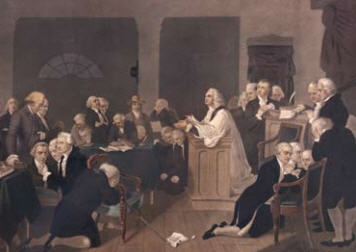Bormuth v. County of Jackson, Michigan
Scoreboard
Case Snapshot
In the County of Jackson, Michigan, Pagan activist Peter Bormuth tried to stop small-town county commissioners from continuing their tradition of voluntary prayer before their meetings. In 2017, Becket teamed up with leading religious liberty scholar and Stanford Law School Professor Michael McConnell to file a friend-of-the-court brief in the Sixth Circuit. Becket’s brief points out that the Founding Fathers would never have viewed legislator-led legislative prayer as creating an official state church, which the First Amendment prohibits. The full Sixth Circuit Court of Appeals heard the case in June 2017 and rejected Bormuth’s crusade in September 2017.
Status
Share this Case

Case Summary
A tradition dating back to the nation’s founding
In the County of Jackson, Michigan, Pagan activist Peter Bormuth tried to stop small-town county commissioners from continuing their tradition of voluntary prayer before their meetings.
The practice of legislative prayer can be traced back to the time of the Founding Fathers, who did not see it as a forbidden “establishment of religion” but rather as a powerful reminder of their own limited political authority: the people’s inalienable rights did not come from government or its officials, but from a divine source that superseded government.
In May 2017, Becket teamed up with leading religious liberty scholar and Stanford Law School Professor Michael McConnell to file a friend-of-the-court brief in the Sixth Circuit, arguing that the Founding Fathers would never have viewed legislator-led legislative prayer as creating an official state church, which the First Amendment prohibits.
What is an establishment of religion?
The job of the First Amendment’s Establishment Clause is to prevent the government from establishing a state church, but determining what establishes a state church has been notoriously difficult for courts.
In 1971, the Supreme Court created a three-part test that attempted to answer that question in the notorious Lemon v. Kurtzman case. The Lemon test was immediately a disaster. Its malleable approach ignored what the Founders considered to be an establishment of religion, invited anti-religious activists to file lawsuits against anything that looked vaguely religious, and led to unpredictable outcomes.
Justice Scalia famously compared the Lemon test to a zombie that frightened small-town America with arbitrary rulings and massive attorneys’ fees. Lemon’s reign toppled memorials to police officers, ended services to prisoners, and censored historic landmarks.
Three years ago, the Supreme Court finally put Lemon in its grave. In its Town of Greece v. Galloway ruling, the Court replaced Lemon’s subjective test with a command that any Establishment Clause test must start with an objective evaluation of our nation’s history. Town of Greece said that because legislative prayer was nothing like what the Founders considered to be an establishment of religion, and in fact was something the Founders approved and practiced, it didn’t violate the Establishment Clause.
The court rejects Lemon and takes the historical approach
Bormuth tried to resurrect the Lemon test and ignore the Town of Greece ruling in two ways: his arguments ignored the history that legislators have opened meetings with prayer since before the founding of the country, and it ignored that Town of Greece explicitly protected legislative prayer.
The full Sixth Circuit rejected both elements of Bormuth’s gambit—following Town of Greece, it ignored Lemon and took history seriously. And because the Sixth Circuit follows Town of Greece, its ruling directly conflicts with another legislative prayer case, Lund v. Rowan County, recently decided by the entire Fourth Circuit Court of Appeals.
On January 5, 2018 Bormuth petitioned the Supreme Court to hear his case but the petition was denied in June 2018. The Sixth Circuit denied rehearing the case on August 24, 2018.
Importance to Religious Liberty:
- Public square: Because religious exercise is natural to human beings, it is natural to human culture. Religious expression, including legislative prayer, should not be treated as dangerous or scrubbed from our public discourse.